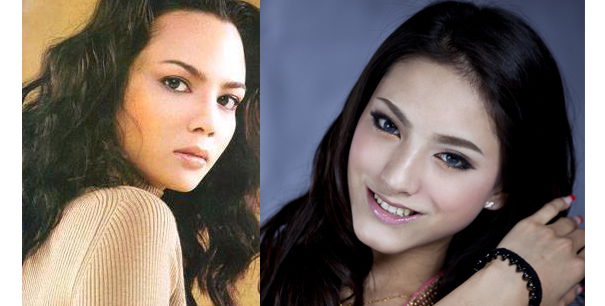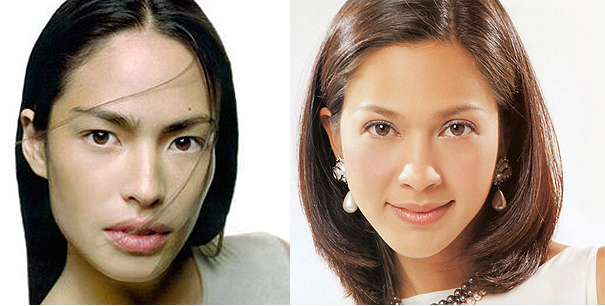An Ugly Duckling Story with a Twist : Beauty in the Eye of the Beholder
BANGKOK, Thailand, Aug. 28, 2002 : When Sirinya Winsiri was a child, she knew she looked peculiar; people told her so.
”I’d be walking down the street and people would basically point their fingers and yell, ‘Farang! Farang!’ ” she said. ”It was really blatant. They were laughing and pointing. It was very hard for a young kid to take.”
Farang is the Thai word for a Westerner, and Sirinya was the daughter of a Thai mother and an American father. She was the only blue-eyed child around.
Two decades later, at 23, she is famous and beautiful, but it is an ugly duckling story with a twist. The duckling still looks the way she always did; it is the idea of beauty that has changed.

Sonia Couling &
As Cindy Burbridge, her American name, she is one of the leading models and television hosts in the country, the beauty chosen to represent Lux soap and Omega watches. Seven years ago she became the first blue-eyed Miss Thailand.
Miss Burbridge is part of a generation of racially mixed Thais who have all but taken over the local fashion and entertainment industries — top models, actors, singers and television hosts. Their success is the product of a revolution in popular taste — a social transformation that began during the years they were growing up that has produced the beginnings of a new, more cosmopolitan Thailand.
Increasingly, the round face, arched eyebrows and small mouth of the classical Thai look have given way in popularity to the sharper and more pronounced features of the West. There has been a similar easing of prejudice in other Asian countries, but nowhere has the look taken over quite the way it has in Thailand.
In a poll conducted two years ago to name the sexiest men and the sexiest women in Thailand, seven out of the nine top scorers were of mixed blood. The people who once pointed fingers at Miss Burbridge now buy blue contact lenses in hopes of looking more beautiful.
”I think of it as a metaphor for the move from traditional Thailand to a more Western or modernized or global culture,” said William J. Klausner, an American who teaches political science at Chulalongkorn University. ”We are in a transition between these two societies, moving from traditional to modern. Well, the halfway house is the luk kreung” — a Thai phrase meaning ”half-children.”
During the past two decades, Thailand has sought to redefine itself as a modern, liberal society, crowding its cities with tall buildings, hustling its way into the world economy and learning to lean back in air-conditioned comfort with an imported cigar and a glass of wine.
Not long ago, the divisions between East and West were starker. The energy and straightforward manner of Westerners clashed with the cool heart, placidity and soft words valued by Thai culture. The thousands of children left behind by American soldiers visiting from Vietnam were ostracized and publicly ridiculed. It wasn’t until the early 1990’s that many racially mixed Thais were granted citizenship.

Nada Hampe &
Morris K., whose father was a black American, said he was taunted and forced into menial labor as a young man. Today, under his jaunty stage name, he is a leading actor and game-show host. Tiger Woods, of course, is the superstar of partly black Thais, elevating their status still further.
As the rage for ”half-Thai” models and actors grew in the 1990’s, talent scouts plucked teenagers from international schools, promising to make them stars. ”It was like, ‘Wow, you’re half, let’s put you into something,’ ” Miss Burbridge said. ”They were really going after the look. It was insane.”
At the forefront was Kathaleeya McIntosh, 29, a half-Scottish model and television host, described in one local publication as ”a wide-eyed, fair-skinned beauty.” Her brother, Willie, 32, is an actor and heart-throb as well.
A newcomer today is Nanda Hampe, 22, a rising international model of part German stock, who was praised by The Bangkok Post for her ”slim face, brown almond-shaped eyes, a stunning cocktail which turns heads and gets cameras clicking.” A weekly magazine, Femme, suggested a deeper beauty, saying, ”She has inherited the soft emotional heart of the East and the tough, go-getting brain of the West.”
That go-getting brain is another sign of change; half-Thais are valued for their ”Western” character as well as their looks. ”They are more confident, more opinionated,” said Wanee Tangjitmankongchai, a casting director for music videos. ”They are more natural as actors.”
And yet, as much as these Thais may be prized for their looks, character or skills, they are never completely embraced.
”Every single day of my life in Thailand, people impress on me that I’m not Thai, something that would never happen in the West, that would be considered extremely rude in the West,” said Giles Ungpakorn, a professor of political science at Chulalongkorn University, who is the son of Thai and British parents. ”Thailand is extremely explosive nationalistically, so that I am never regarded as a Thai citizen when people look at my face.”
Miss Burbridge, who has spent her life in Thailand and speaks perfect Thai, faced this challenge from her countrymen when she was chosen to represent the nation at the Miss World contest in 1996. ”When I went into the pageant, people were like, ‘Who is this girl?”’ she said. ”They couldn’t believe that I could be representing Miss Thailand. A lot of media were saying, prove that you’re Thai. How can you prove that you’re Thai? That’s a tough question. How do you prove that you’re anything?”
No matter how popular she has become, she said, the pain of discrimination has stayed with her.
”Even now, when people point at me and say my name, the first feeling that comes is the feeling from when I was 4, that sinking feeling, ‘Omigod, they’re talking about me,”’ she said. ”It was something that was put into me at such a young age. It’s hard to get rid of. I’m working on it.”
Copyright The New York Times